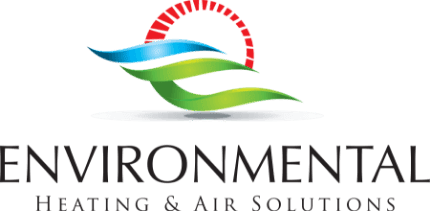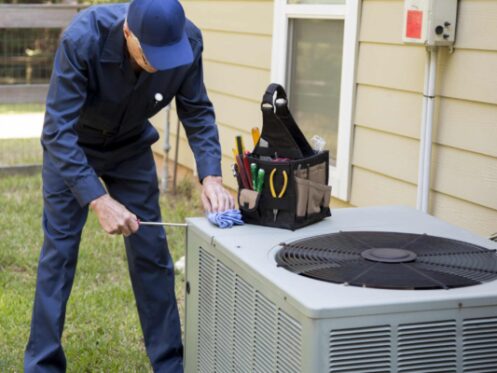Updated July 2023
A good air conditioner can make a room more comfortable, reduce energy consumption, and even reduce coughing and sneezing. Performing regular maintenance on the AC greatly enhances its overall efficiency and durability. Keep reading to learn more about improving AC efficiency in your home.
1. Change the Filter
The effectiveness of a home’s air conditioning depends on how well it filters out harmful particles from the air. The dirtier the filter gets from collecting particles, the less efficient it is at filtering them out.
A clogged air filter puts strain on the AC system as it works to cool the house. This strain translates into extra energy usage and higher cooling expenses. Inspecting the filter on a monthly basis and replacing it if necessary can help prevent excess this type of excess strain on your AC system.
2. Inspect the Outdoor Unit
The condenser, which is located outside, is a big part of how well an AC system works. Keeping the area surrounding the condenser free of debris, like leaves and standing grass, helps the condenser maintain proper airflow and operate at maximum efficiency.
3. Invest in Ductwork Cleaning
Does your air conditioner utilize ducts to bring cool air inside the house? If that’s the case, keeping all ducts clear of debris is crucial. If even one air duct is clogged, the whole air conditioning unit will have to work much harder, which will wear it out more quickly.
Have the ducts checked and cleaned by a professional before you switch on the air conditioner during the cooling season. This helps the AC work better and lets the technician see if any other issues are present, such as mold growth in the ductwork. Mold remediation in ductwork has been shown to have a significant impact on allergy and asthma symptoms.
4. Turn On the Ceiling Fan
Consider installing a ceiling fan to get the most out of your air conditioner and lower your monthly bills. Even though the AC is effective at cooling the immediate area, a fan can distribute the cooled air to other sections of the room, which can help the room cooler more quickly than just the AC running on its own.
5. Use a Smart Thermostat
A smart thermostat peels back the curtains to reveal an inside look at your real energy use. It uses sensors and advanced technology to figure out a family’s habits and uses what it learns to regulate heating and cooling to coincide with when a house is inhabited or about to be. This means that heating and cooling systems don’t have to work as hard when no one is home for a long time.
6. Install Window Shades
Many AC professionals recommend using window shades to help control indoor comfort. The Department of Energy estimates that during cooling seasons, 76% of the sunlight that hits typical double-pane windows penetrates to create heat. Coverings for windows will help mitigate the negative effects of this heat by facilitating temperature control and decreasing the cost of heating and cooling a space.
7. Be Smart With Landscaping
Improving the efficiency of the AC doesn’t always require working on or cleaning the system itself. A lot of what affects the system stems from the landscaping. A system installed in an area with lots of shade will help keep the system cool and reduce wasted energy. Contact us at Environmental Heating & Air Solutions to find out how having trees, bushes, and vines in the right places can help your AC work better.
8. Avoid Frequent Cycling
The AC system uses a lot of energy as it kicks on and off. For example, it’s better for an AC to run for a full hour straight rather than kicking on and off three times every 60 minutes. If your AC is constantly turning on and off, this is called excessive cycling.
One possible reason for excessive cycling is a faulty thermostat or condenser. One of our technicians can help figure out the cause and make appropriate repairs, such as replacing the thermostat or cleaning the condenser.
9. Install a New System
Generally, a new, high-efficiency air conditioning system will provide cooling for 15 to 20 years, assuming it receives proper maintenance and care. If you’re nearing this benchmark of time and experiencing more frequent issues with your AC, it may be time to start considering a replacement unit as this could be more cost-efficient in the long run compared to frequently repairing components of an AC unit that is the end of its life.
10. Be Careful With Sizing
When buying an air conditioner, it is important to get one that is the right size for your home. A system too large for your home doesn’t translate into faster and more efficient cooling; instead, it can result in raised energy costs and reduced indoor comfort.
11. Seal All A/C Ducts
You can save several hundred dollars a year on HVAC expenses by having your heating and cooling ducts checked and sealed by one of our competent professionals. Instead of taking shortcuts with duct tape, we use actual sheet metal screws and mastics to fasten and seal A/C ducts to seal any leaks properly.
12. Cook Less
A lot of hot air gets emitted into the air when you cook, especially when using a stove or oven. As a consequence, the AC must work harder to keep the home at your preferred temperature. Cooking outdoors during the warmer seasons can reduce this problem, and as a plus, it gives you a reason to spend more time with nature.
13. De-ice
An AC unit with ice on it is not something that should be ignored. One of our technicians can come and inspect the system to determine the cause of the ice and address the problem appropriately. Two of the most common causes of ice on the AC include a dirty filter and a leaky coolant line.
14. Reduce the Use of the AC
Set the thermostat to raise the indoor temperature or to completely shut off the system during periods of time when you’re away from home. This will reduce the use of the AC, which translates into lower cooling costs.
15. Turn Off Electronics
Even when not in use, electronics use energy and emit heat. If your home is full of electronics, like TVs, computers, and other media systems, they can produce so much heat that it takes a toll on the AC. To avoid this, turn off your electronics rather than leaving them passively running when you’re not using them.
16. Get Yearly Inspections
Have the AC serviced at least once a year, and get any repairs done as quickly as possible. Just a few weeks before the warm season begins is the perfect time to arrange a regular service to make sure it is fully functional and ready for the heat. Air conditioning units with defects or malfunctions lose efficiency, but annual servicing can fix the flaws before they cause problems.
Improve the Efficiency of Your Northern CA AC Today!
Use the tips mentioned above to keep your home cool and comfortable without compromising the efficiency of your AC. Contact Environmental Heating & Air Solutions now to learn more about AC installation and efficiency.

